
The Art of Interviewing
By: Natalie Rogers

You know the feeling when you’re trying to fast forward to a specific part of a movie? Skipping through content you’re not interested in to just get to that one scene you want. Well, that’s what it’s like as a recruiter interviewing someone who isn’t giving you the information you’re looking for.
Interviewing is an art. However, entering the conversation with a plan and structure will provide your interviewer with the nuggets of information they are seeking, and prove you are the perfect candidate for the role.
So, what’s the best way to condense all your years of experience into a few minutes for an interview?
The funnel approach to interviewing
Taking a funnel approach will help you convey the right information to your interviewer. Start with broad, contextual information first, then drill down into the specifics.
Company overview
Talk through who your employer is, especially if they are not a well-known brand or organisation.
- Start with the basics – give an overview of the product offering, market positioning, target market, selling channels, size of the team, and reporting structure.
- Put your employer in context – did you work for a small family-owned business with high levels of stakeholder management or a large multinational organisation where you interacted with global teams daily?
- Help your interviewer understand the business environment you were operating in. For example, if you were working during the GFC, an acquisition or merger, portfolio in growth or decline, or difficult market conditions. This helps explain your experience so that your interviewer can understand the challenges you faced and the skills you developed to work successfully within that environment.
“ABC Foods is a challenger brand within the health food space. We have a range of 25 SKUs within the beverages category that sell through Coles, Woolworths and Independents nationally. Prior to me stepping into the role, the business had an unsuccessful sub-brand launch into the juice category, so the portfolio was in -4% decline and at risk of deletion from Coles.”
Role specifics
It is essential to communicate a clear understanding of your mandate within the business. Role titles can mean different things to different businesses - for example, Brand Managers in different types of organisations can have completely different responsibilities. Explain the circumstances you inherited when you stepped into the role, as well as the responsibilities you managed and delivered within the business.
“As the Brand Manager, my key focus was developing a new strategy to be able to arrest the decline within the new portfolio and present this to Coles with the Account Manager.”
Key projects and achievements
Think about your key successes and projects you worked on during your time in the role. For example, the delivery of a new product launch or campaign to market, a brand repositioning project, or a range rationalization.
ALWAYS use the CAR or STAR technique when giving examples. This provides a clear structure for talking about your achievements.
- Circumstance/situation: identify the challenge, problem, or objective of the project.
- Action: give an indication of your specific role and responsibilities.
- Result: how was the success of the project measured and how did you perform against the target?
“I led a refresh of the packaging of the juice range, after it was identified through consumer insights that the premium price positioning didn’t align with the look and feel of the existing packaging, hence the low uptake by consumers in market. I was the project lead, working alongside our Quality and Procurement teams to source and rollout a new range of packaging across 15 SKUs. I then led a social media brand awareness and influencer campaign to relaunch the brand to market. As a result, we saw a 15% sales uplift within the first three months, against a target of 10%.”
Running through specific examples in advance of your interview will help spark the essential points you need to convey to your interviewer to prove you are the right person for the job.
RELATED: The ultimate guide to preparing for a video job interview
Looking for a job? Browse Six Degrees Executive's current opportunities.
Related


Meet the Experts: Nicole’s insights on the evolution of digital marketing
Welcome to our Meet the Experts series, where we spotlight the industry specialists at Six Degrees...

7 ways to revamp your EVP in 2025 to attract and retain talent
Gone are the days when office perks like foosball tables and free lunches were enough to attract...


 Accessibility
Accessibility
